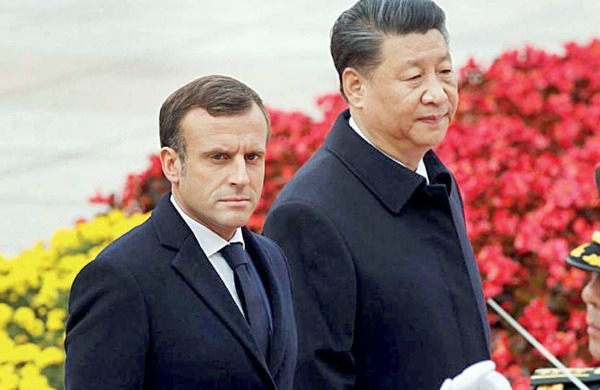Recently, a French politician cited a cooperation agreement between France and China under Jacques Chirac France to build a laboratory in China that was put into operation in 2018, and that the Chinese government in violation of the initial accord which allowed Paris to monitor the activities of the lab for five years did not allow the French to do the supervision. Therefore, the politician has recommended to the French government to coordinate with the British and German governments to call for an international inquiry into the laboratory’s activities.
French officials summoned the Chinese ambassador in Paris to express ‘disapproval’ over comments on the embassy website condemning France’s coronavirus response. “I made clear my disapproval of certain recent comments when the ambassador … was summoned this morning,” Foreign Minister Jean-Yves Le Drian said in a ministry statement, adding that the remarks were not in line with the “quality of the bilateral relationship” between France and China.
The Chinese embassy published on its website a long text titled “Restoring distorted facts – Observations of a Chinese diplomat posted to Paris”. The diplomat, who was not named in the text, slammed the Western handling of the coronavirus outbreak, saying it had been sluggish.
In particular, the diplomat, which Le Monde said was the ambassador himself, Lu Shaye, accused workers at nursing homes of “abandoning their posts overnight… and leaving their residents to die of hunger and disease”, prompting a furious response from French politicians…
Considering the French Foreign Ministry’s type of objection to the Chinese ambassador in Paris over the content of the embassy’s website and the continued attention and monitoring of French authorities of all aspects of the embassy’s activities, Amelie Montchalin, the foreign minister’s adviser, and a member of the French government on March 29 accused China of taking instrumental advantage of its international aid to other countries to counter corona.
The issue of the expulsion of a Chinese diplomat living in Paris has also been raised in the French domestic and political media, with sharp criticism of China’s behaviour and actions in public and fascist opinion.
The high-profile publication of the Chinese ambassador’s summons to the French Foreign Ministry is gradually reflected in the hidden layers of the conflict between China and France and the obvious and cautious efforts of Paris to accuse China of spreading coronavirus to other parts of the world.
On March 31, a group of French lawmakers, along with their counterparts in Taiwan, issued a joint statement expressing regret that Taiwan, despite all its achievements and cooperation with the World Health Organization in controlling the coronavirus, is still outside the organization. Certainly, this issue and its proposal by the members of the French parliament, which is considered a matter of sovereignty for China was not to the liking of the Beijing authorities.
Until 2016, Taiwan had been a member of the World Health Organization. But in that year, after Tsai Ing-Wen came to power and his refusal to recognize the principle of the unity of Taiwan and China as a country, Taiwan was excluded from the World Health Organization thanks to Beijing’s efforts.
The issue of the temporary disappearance of Meng Hongwel, the former Chinese chief of the International Police Headquarters based in Lyon, last year, and subsequent accounts of the Paris-Beijing dispute over strange incidents that led to the recall of former Chinese Vice Minister for Public Security and President of Interpol (2016 – 2018) and Beijing’s exclusion from the presidency of the very important international police organization, still throws its dark shadows over Paris – Beijing relationship.
French political circles, meanwhile, have been critical of the French government’s engagement with China, especially in economic relations, noting that it was only Trump’s offensive against China that gave Drian the courage to criticize China.
The same circles are pointing to China’s responsibility for nearly 140,000 deaths due to corona outbreak in the world and Beijing’s economic conditions, which, after containing the virus, give the French government the right to do whatever it wants to get rid of economic domination and refrain from consuming Chinese goods, although some other sources, given the low standard of living of French people in some parts of the country, do not consider it possible.
On the other hand, many large and medium-sized French companies due to the favourable facilities and conditions that are used to transfer their production plants to China especially the issue of the tax system for foreign companies are based in China and have created investments and depend on the Chinese economy which cannot be halted easily. Meantime, these companies are unlikely to be willing to change their position.
On the other hand, while the West’s conflict with China has escalated in cyberspace, China has developed capabilities that skillfully exploit the talents needed to enter and influence the space within its goals. In one of the topics covered by the European media, including the French, Paris is accused of attacking China and imposing war on Beijing in the 19th century, which resulted in the free and exclusive sale of drugs in China. The French are also accused of distributing drugs in a similar case in Indonesia.
In conclusion, it must be said that the Chinese after great efforts to contain COVID-19 have tried in recent weeks to send free shipments of anti-corona medical supplies to other countries especially the Europeans some of them free of charge. European states have made no secret of their displeasure with China’s behaviour, arguing that Beijing, under the guise of charitable activities and health diplomacy, is advancing its geopolitical points of view and is seeking to rewrite the source of corona’ outbreak in China.










0 Comments